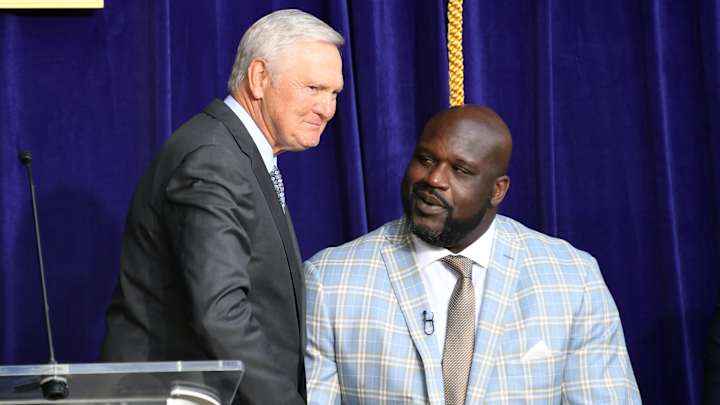Lakers News: Jerry West Predicted Kobe Bryant And Shaquille O'Neal's Bright Future Together

As a player, Jerry West's signature Lakers moment may have actually happened in defeat. Although he won the 1972 NBA title (with a lot of help from Finals MVP Wilt Chamberlin), the 6'3" combo guard was convinced he underperformed in the series. West may have truly peaked in 1969, when his loaded Lakers team, featuring three of the 20 best players ever in himself, Chamberlin, and Elgin Baylor, fell in seven games to the Boston Celtics in Bill Russell's last hurrah. West, who averaged 37.9 points, 7.4 assists and 4.7 rebounds in the series, won the Finals MVP award despite losing the series, the first and last time that has ever happened.
As an executive, however, West's biggest triumph may have happened in between his many, many championships (he's won eight in a front office capacity). During the fateful summer of 1996, West convinced 24-year-old All-NBA center Shaquille O'Neal to ditch the Orlando Magic for the Great Western Forum in free agency. He also engineered the trade that would send incumbent starting center Vlade Divac to the Charlotte Hornets in exchange for the draft rights to future 18-time All-Star shooting guard Kobe Bryant. For good measure, West also drafted point guard Derek Fisher out of the University of Arkansas -- Little Rock with the 24th pick.
That tandem would go on to win three consecutive championships together starting in 2000, with Fisher functioning as a crucial bench role player supporting the immortals. The 6'1" point guard would move into a starting role during Bryant's last two titles with L.A., won in 2009 and 2010.
In a new interview for Hulu's epic 10-part documentary "Legacy: The True Story of the L.A. Lakers," O'Neal details an early conversation he had with team president West after first signing on as a Laker that summer. It appears West, himself a Hall of Famer and 14-time All-Star, knew what he had in the 7'1" former Magic big man and rookie shooting guard Kobe Bryant.
Here's Shaq's full quote:
"The first thing Jerry West did when I got there: he sat me down and he said, 'Look up.' As I look up, he says, 'Son, if you can come here and win multiple championships, your name will be up there one day.' He said, 'It ain't gonna take long. I just signed this kid. You and him are gonna win a lot of championships."
Both of Bryant's jersey numbers (eight and 24), as well as O'Neal's No. 34 jersey, have joined West's in the rafters.
West called it. Though Bryant, just 18 years old that season, was merely a bench role player to start off his career (he would average just 15.5 minutes a night that first season), plenty of other Lakers legends sensed the kid could one day reach greatness.
Former Showtime era power forward Kurt Rambis, then an assistant coach under Del Harris, indicates in a fresh interview (and, subsequently, a conversation recorded during the team's 1996 training camp) that L.A. personnel could tell Bryant was going to be special. A Showtime starter at Bryant's position, Byron Scott, developed a special bond with the young lottery pick that season, as he reflects on in interviews both past and present.
The fans felt it too. "He was loved from day one," Shaq notes of Bryant's glowing reception from the Forum faithful.
Starting point guard Nick Van Exel reveals that he owned a variety of Michael Jordan highlight compilations on VHS, which Bryant, who famously made a habit of meticulously imitating Air Jordan's on-court behavior, asked to borrow. "And I have never seen those tapes again," Van Exel chuckles.
Scott discusses the contrasting personalities and styles of O'Neal and Bryant, the team's eventual superstar tandem, during this period. Bryant is described by Scott, O'Neal, and Van Exel as being eternally serious and intense. O'Neal, already one of the league's most dominant players, was a more fun-loving and gregarious type.
